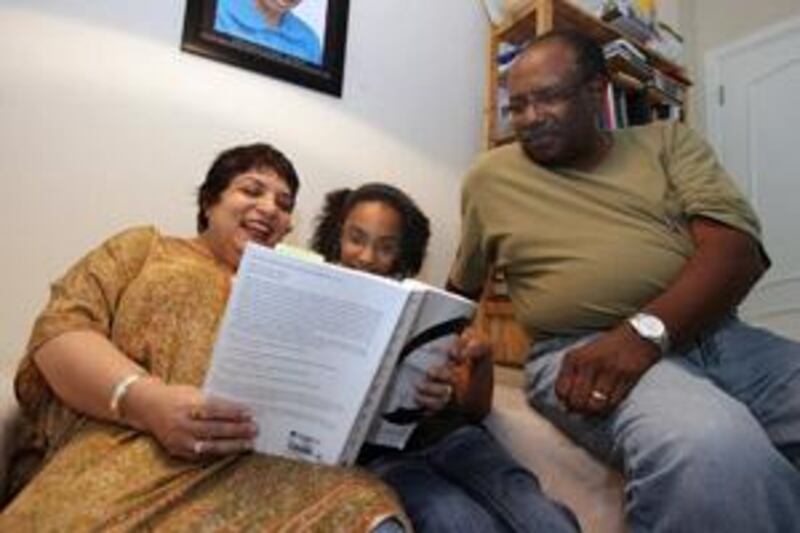Poonam Arora is ready, a stack of books on the coffee table in front of her. "OK, this one I'm in the middle of," she says, handing over the thick book on top: Islam: To Reform or to Subvert. "It's a tough read," admits Aroroa, a professor of colloquy (humanities) at Zayed University. "But it's ground-breaking material. Mohammed Arkoun, an emeritus professor at the Sorbonne University in Paris, is saying that the West and the Muslim world have to move away from their stuck positions: 'Oh, the West is corrupt. We won't deal with it.' And equally: 'The Islamic world is not democratic so we won't deal with it'." As an Indian, Arora says: "I've had some experience being a broker between the two. This book speaks to me."
Arora's husband, Richard Turner, an adjunct professor in the same department, and the couple's daughter, Mansuda, almost 12, sit on a nearby couch in the family's airy Muroor Road villa, listening and waiting patiently, their books beside them. "I like to read a serious book and a lighter book simultaneously," Arora continues, telling me about the book she has just finished: Once Upon a Country: A Palestinian Life by Sari Nusseibeh, president of the Al Quds University in Jerusalem. "I didn't plan it, but there is some convergence there," she says, pointing to the first book and the one in her hand. "I'm interested in books that suggest ways to get a grip on social ills, ways that they can be peacefully resolved. That's how I teach. That's how I do research."
Arora is also in the midst of a third book: Zen and the Brain by the neurologist James Austin. Although she has no background in science - Arora's field is film studies - she has been intrigued by the book's premise that "the more evolved brain is the one that can accommodate the crises of modern living". Clearly she is more drawn to non-fiction. "I can't remember the last time I read a novel,"she says, and smiles at her husband and daughter. "Those two are the fiction heads." Turner, originally from New York, explains that for years, he, too, read only non-fiction. But a couple of years ago he began reading historical novels, an interesting swerve for a professor of American history. (His period is pre-Revolutionary War.) "Historical fiction is bigger than life," Turner says, face lighting up. "I love to see a real character from history in a novel, to see how an author weaves that character into the story." He's particularly fond of Colleen McCullough, the Australian author of the international bestseller, The Thorn Birds, who has also written a series of novels on ancient Rome. Turner is midway through Caesar's Women right now, calling McCullough's research "impeccable" and the novel "exciting". "But then again," he adds, "the characters she is using are exciting. These are multifaceted characters with great flaws."
A reflection of where he now lives, Turner is also reading a historical novel set in the Middle East: The Sword and the Scimitar by David Ball. "I'm actually a slow reader," he confesses, though as a younger man he spent close to 10 years "reading just about everyone - from Baldwin to Pushkin". With books being so important to them both, do dinner discussions often revolve around what each is reading? "Actually," says Turner, "we talk mostly about Mansuda's books." Mansuda, a petite girl with a halo of black hair pulled back with a polka-dot bandanna, grins. She has been biding her time, books on her lap, and finally it is her turn.
"I read all four of the Twilight books between February and March. But I didn't like the movie," she adds quickly, as if anticipating my next question. "She likes fantasy," explains Turner. "It's not fantasy," insists Mansuda. "Fantasy is too much for my brain to handle." But how did she feel about Bella, the book's main character, who many female readers find passive, even vapid? "Nobody really likes Bella," says Mansuda. "She's like a blank slate. All the other characters have so much personality." Speaking of personality, she admits to still liking Junie B Jones, the series for younger readers about a feisty six-year-old. "I didn't really like chapter books until I discovered Roald Dahl," she says.
Mansuda continues to discover new books by Twilight's author, Stephenie Meyer, recently finishing The Host. But she is ready for a change of pace and period, with plans to read Emily Brontë's Wuthering Heights next. "I read all the time. I can spend hours at that one shelf at Magrudy's: Teenage Fiction. I used to want to edit books. Now I want to write them," she says. Her parents exchange a smile. "We have read to her since she could walk," says Turner. So, did Mansuda's parents read books in front of her to set an example?
"Not really," says Turner. "My reading happened when she was in bed." "Now when I read, you're in bed," says Mansuda. The Arora-Turner family's picks Islam: To Reform or to Subvert by Mohammed Arkoun Once Upon a Country: A Palestinian Life by Sari Nusseibeh Zen and the Brain by James H Austin Caesar's Women by Colleen McCullough by David Ball Twilight by Stephenie Meyer
Wuthering Heights by Emily Brontë





